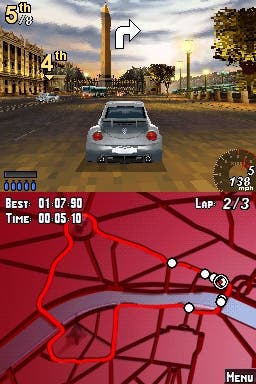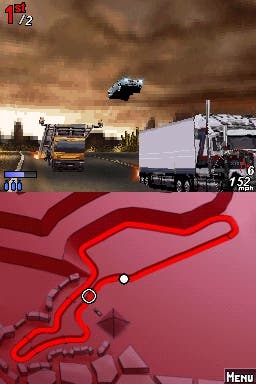Asphalt Urban GT
A suggestion for Asphalt 2's licensed soundtrack: Travis - TURN.
Life, they say, is a marathon, not a sprint. This is a good thing for Nintendo, because one thing that's become apparent about the DS is that touch controls and dual screens aren't really suitable for racing. The PSP might do a Paula Radcliffe and run out of juice sooner on its way round the course (did no one think to plug Paula into the mains for a bit?), but over a shorter distance the likes of WipEout Pure and Ridge Racers are fast and elegant. By comparison, racing games on the DS move with all the speed and grace of a gin-soaked octogenarian.
To a certain extent Ridge Racer DS suffered because it was a port of an N64 game that wasn't very good anyway, but it was mainly the way you couldn't steer unless you learnt how to play the game through its intangible air hockey interface that put me off. That and the fact that racing games are somewhat hamstrung when you can barely see what's going on until it's too late to avoid slamming into a wall.
Asphalt Urban GT, the other racing game in the DS launch line-up, suggests that Ridge Racer's problem of forcing the gamer to drive more or less blind whenever the speedo sneaks above jogging pace wasn't a one-off. While developer Gameloft has done an admirable job of creating a 3D engine for its city-themed real-car racer, the crescendo of creaky textures and low-poly models it's struggling to sustain is simply too jagged and lacks too much detail for you to judge corners effectively until you've had a chance to learn the courses. Not much fun when you're in uncharted territory on the last leg of a four-course championship. Mind you, Gameloft doesn't exactly help itself by working hard to maintain a game engine where you can't see corners in time and then building a racing game that won't allow you to corner anyway.

Asphalt is perhaps angling itself as a middle ground between arcade and simulation. As such, all the vehicles have very tangible handling and weight characteristics, rocking on their axles as they screech into sharp turns, and demand realistic braking distances at that, but when you do corner you'll find yourself power-sliding almost without intention, while your boost meter fills up quicker if you race into oncoming NPC traffic or perform risky manoeuvres and jumps, a bit like Burnout.
Comparisons to Burnout though really must end there lest you get the wrong impression. Asphalt Urban GT has certainly borrowed some good ideas and struck out for an interesting niche (if there are indeed still niches left unexplored in the racing genre), but in getting there it makes you run smack-bang into a wall 32 times in succession at 150mph. Driving into traffic is hair-raising and risky, all right, but that's mainly because you can't see the headlights until it's nearly too late - and because it's pretty easy to get snagged on them at that. At one point I had to restart an entire race because a pair of computer controlled morons blocked the road entirely, and there doesn't appear to be any way of reversing.
Other attempts to infuse the game with an arcade sensibility come up equally short. Car transporters pootling around the track ahead of you can be used to soar through the air, but, when the camera cuts away to a third-person view, more often than not what it actually frames is your poor car hurtling into an invisible wall at the top of the corner you hadn't noticed. The camera also cuts away for smaller jumps, and in another nod toward Criterion's Burnout series it repositions itself following a heavy prang to show you doing a 360 spin. Which would probably be quite cool if you didn't wind up pirouetting the exact same way every single time - so much so that our drunken octogenarian starts to consider figure skating as a potential pension booster.
The different licensed vehicles - from the likes of Jaguar, Hummer, Saleen, VW and others - are most easily differentiated by how fearsomely they hammer the barriers. It's so easy to lose traction and hit the edges that what you're actually driving is largely irrelevant. At the top end, Saleen's are bottle rockets waiting to explode down a straight and then understeer enough that you cannon back and forth off the sides through a chicane, but while it's easier to react to corners in the slower-moving Humvees, the extra weight on the suspension means the same is true. At times it's like ice racing. You can certainly see the cracks.

At least you're not the only one having problems. Your computer controlled opponents seem to have just as much difficulty sticking to their racing lines, allowing you to keep in touch with them by spending more time trying to re-lay the gravel traps than swooping round corners menacingly. Or doing anything menacingly, for that matter. For those tracks that don't have gravel traps (this is a city-based racer after all, with tracks including a Cuban airport and plenty of little nods to popular landmarks), we assume they were trying to find a turning for the Job Centre.
To be fair, Asphalt's not so ridiculously hard that you won't play it if it's thrust upon you, even if there is much to complain about, and the "Evolution" mode, which allows you to build up a garage by racing for money and car rewards, will certainly keep you going. Meanwhile "Cop Chase" tasks you with chasing down a series of cars against the clock and then keeping them locked in the centre of your view for three seconds to apprehend them, and seems like the most entertaining bit of the game. Fittingly, then, there's no actual reward for doing so - and played over the game's multi-card-only wireless link there's not even any way to choose who's the cop and who's the robber.
In striving for a balance between arcade and simulated racing Asphalt Urban GT blends a number of interesting ideas. Unfortunately, whether by design or by quirk of the DS's design, it simply doesn't get the basics right. It's no fun to drive, and in fact driving itself is something of a challenge. On top of that, having begun life on other formats (including N-Gage), it makes only a token gesture to adapt to the DS's featureset, allowing you to navigate menus but do nothing else with the stylus, allowing wireless multiplay but demanding multiple copies of the game, and using the bottom screen for little more than a topographical overview of the course with markers for each car. Granted, Asphalt Urban GT was never going to win the sprint against the PSP's fleet of competitors, but it could at least put its running shoes on.

